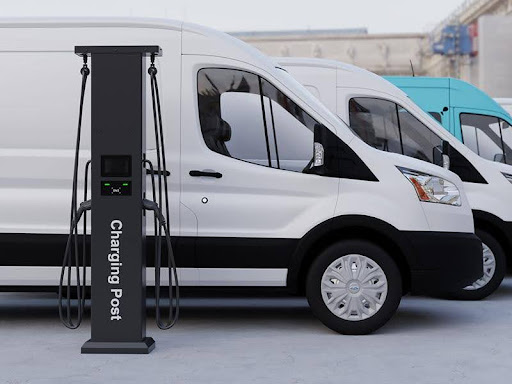“Fleet electric vehicles” refer to the use of electric vehicles in a fleet operated by an organization or business. It encompasses a variety of vehicles serving different purposes, such as transportation, delivery, and services. Due to the rapid growth of the electric vehicle industry, many fuel-powered vehicles are gradually being replaced by electric vehicles, and fleet vehicles are no exception. They are making the transition from traditional internal combustion engine vehicles to electric vehicles.
Features of Fleet Electric Vehicles
There are significant differences between fleet electric vehicles (EVs) and traditional internal combustion engine vehicles. Here are the key features of fleet EVs:
Zero Emission: Electric vehicles are different from fuel vehicles, electric vehicles are powered by electric energy and produce zero exhaust emissions, which not only helps to reduce energy shortage and achieve sustainable development but also helps to reduce air pollution and greenhouse gas emissions and achieve green travel.
Energy Efficiency: Electric vehicles generally exhibit higher energy efficiency than traditional internal combustion engine vehicles. They convert a higher percentage of energy from the grid into power for the wheels, resulting in reduced energy consumption per mile.
Lower Operating Costs: Over their lifetime, electric vehicles typically have lower operating costs compared to conventional vehicles. They require less maintenance, and charging is often more cost-effective than traditional refueling.
Lower Fuel Costs: The cost of electricity to charge an electric vehicle is generally lower than the cost of gasoline or diesel, so reduced fuel bills for fleet operators. In addition, the power company implements the peak and valley time-of-use price, and the electricity charge standard is higher when the power supply is tight. Charging when the power supply is sufficient, the charge standard is lower. Therefore, through power management, charging costs can be lower.
Quiet Operation: Electric vehicles operate quietly, contributing to a reduction in noise pollution. This is particularly advantageous in urban areas and applications where noise reduction is a priority.
Flexible Charging Options: Fleet EVs can utilize various charging options, including Level 1 (standard household outlet), Level 2 (dedicated charging station), and Level 3 DC fast charging. Fleet operators have the flexibility to choose the charging infrastructure that best suits their needs.
Connected and Smart Capabilities: Electric vehicles often come equipped with connected capabilities, enabling fleet managers to monitor and manage vehicles remotely. This includes real-time tracking, diagnostics, and the ability to plan and optimize billing.
Joint Offers Tailor-Made Charging Solutions for Fleets
As a well-known electric vehicle (EV) charger supplier,Joint offers fleet operators a range of services and features specifically tailored for charging fleet vehicles.
Customized Charging Solutions: Fleet charging needs may differ from those of individual consumers. Joint EV Charger suppliers can provide customized solutions, such as a hybrid use of Level 2 and Level 3 DC fast charging stations, to meet the specific requirements of fleet operations.
Network Charging Stations: Fleet operators benefit from network charging stations that provide real-time monitoring, scheduling, and remote control of charging sessions. These systems optimize charging loads, manage energy consumption, and prevent grid overloads during peak hours.
Fleet Management Software: Charger providers may offer fleet management software that allows for effective monitoring and control of multiple charging stations. The software provides insights into usage patterns, energy consumption, and overall fleet charging performance.
Load Management Services: To prevent grid overload and effectively manage energy consumption, our electric vehicle chargers offer load management services. This includes functions such as load balancing and scheduling charging during off-peak hours.
Billing and Payment Solutions: Joint Electric Vehicle Chargers offer billing and payment solutions for fleets that support various models, such as subscription-based services or pay-per-use options. This could include integration with existing fleet management payment systems.
Installation and 24/7 Customer Support: Joint provides end-to-end services, including site evaluation, installation, and ongoing maintenance. Joint also offers 24/7 quality service to address technical issues, billing inquiries, and any other challenges that may arise during fleet charging operations.
Compatibility with Various Models: Since fleets may include different types of electric vehicles, Joint DC EV Charger providers offer charging stations that support a variety of charging standards and connector types to ensure compatibility with the entire fleet.
Conclusion:
Joint electric vehicle charger manufacturer supports innovative research and development, charging pile products in OCPP, ISO18115, and other communication protocol applications worldwide. Joint supports a sustainable future and always provides customers with a seamless and efficient charging experience and high-quality customized services.





Be First to Comment